Day of Empathy

Day of Empathy will take place across 50 states, and focus on uplifting stories of people impacted by the criminal justice system to encourage legislative action Continue reading

Day of Empathy will take place across 50 states, and focus on uplifting stories of people impacted by the criminal justice system to encourage legislative action Continue reading
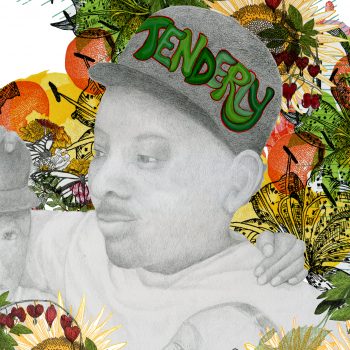
by Ross Brockway of the Georgia Justice Project. Artwork by Kim Vanderheiden. Reprinted from The Conscious Lawyer magazine’s special feature of the work by members of PISLAP (Project for Integrating Spirituality, Law and Politics.) If you feel moved by this story, please support the work of the Georgia Justice Project and PISLAP, and sign up to receive The Conscious Lawyer where you’ll find many more articles inspiring and informing us to practice law with awareness and intention. Continue reading

Elaine Quinn is the editor of The Conscious Lawyer, a professional magazine and website devoted to positive, socially aware developments in legal practice and thinking. Elaine has also contributed thought provoking, in-depth book reviews on this Justice Conversation website. I asked Elaine if she would be willing to share with us some of her experiences in the founding and development of her magazine. Here’s what she had to say: First, let’s give our readers a sense of what The Conscious Lawyer is. Can you describe the overall concept? In simple terms, The Conscious Lawyer is for lawyers*, (*when I use the term lawyers, I mean anyone working or studying within the field of law) that are interested in using the instrument of law for good. This is a desire to do good that arises from the realization that we are all deeply interconnected. It seems to be a shift in… Continue reading

“As you watch this film you may experience a range of powerful emotions. Please know that you are not alone. May our thoughts and feelings create fires that ignite the gifts of learning, healing, and transformation. May we recognize and honor the depth of our inter-connectedness. May we nourish the flames that burn away hatred and fear. May we utilize these gifts to mend ourselves and our communities.” These words begin the film, “Healing Justice,” which has been recommended to us by a friend familiar with the Justice Conversation project. It is a good film for sharing with educators, law enforcement, judicial professionals, as well as non-profits. After viewing it, I also want to emphasize that it’s a good film for adults in the general public. For anyone who votes. For anyone who may at some point come into contact with our justice system. For you. I will add, though,… Continue reading
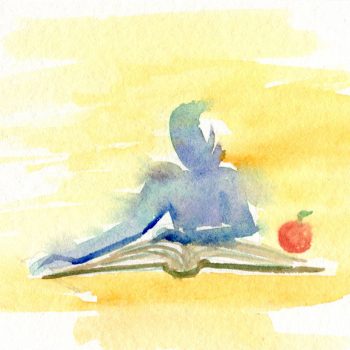
Rand Corporation has conducted a randomized controlled study, sponsored by the National Institute for Justice, on the effectiveness of restorative practices on suspension rates and classroom atmosphere. The study took place in the Pittsburgh Public School District during the 2015/16 and 2016/17 school years. The researchers sought to answer three key questions: 1) how the specific program used was implemented and what challenged or facilitated restorative practices; 2) what were the impacts of this program; and 3) how likely is it that the restorative practices will be sustained over time? The key findings indicated an improvement in school and classroom climate, decrease in overall suspension rates, and fewer disparities between minority and low-income students when compared to white or high-income students. They did not find academic improvement or a reduction in arrest rates. Recommendations following the report include emphasizing restorative practices that can be woven into the school day to… Continue reading
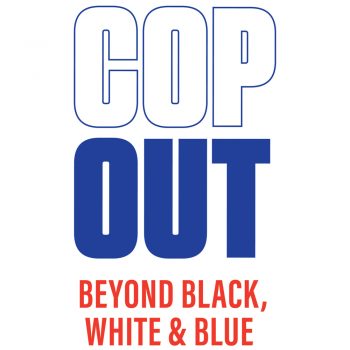
Below is a link to a recorded interview produced by Think Out Loud, a weekly program from Oregon Public Broadcasting, featuring Kevin Jones, co-founder and Artistic Director of the August Wilson Red Door Project, and Portland Police Deputy Chief Robert Day. They are discussing the Red Door Project’s new production, called Cop Out, which is a series of monologues based on playwrights’ interviews with police officers. Cop Out is currently in previews and will have it’s world premiere November 30th through December 2nd at Self Enhancement, Inc., in Portland. The monologues in Cop Out depict stories of police officers of varied rank, experience, race and gender, as they interact with each other, their families, the institutions they represent, and the community they are sworn to protect and serve. Cop Out is the next step in a journey that began with the Red Door’s previous production of The New Black Fest’s… Continue reading
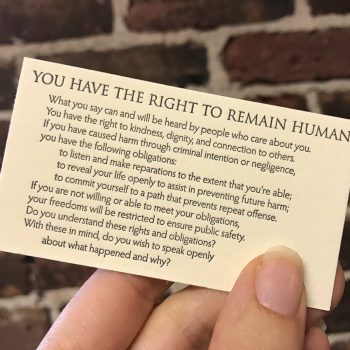
contributed by Kim Vanderheiden You have the right to remain silent. Anything you say can and will be used against you in a court of law. You have the right to an attorney. If you cannot afford an attorney, one will be provided for you. Do you understand the rights I have just read to you? With these rights in mind, do you wish to speak to me? In 1966, the U.S. Supreme Court gave its decision in Miranda v. Arizona, requiring that suspects in police custody be alerted to their 5th Amendment rights before interrogation. The court did not rule in what manner or with what language suspects were to be informed. Subsequently, then Deputy Attorney General Doris Maier, along with Nevada County District Attorney and internationally renown letterpress printer Harold Berliner, were called upon to write concise language that officers in the state of California should use to… Continue reading
Initiated by Mothiur Rahman of New Economy Law, supported by Gita Parihar of UK Youth Climate Coalition, and Kim Vanderheiden of Justice Conversation. A conversation with Peter Gabel & Nanette Schorr of PISLAP, a US network of lawyers, academics, law students and other legal professionals at the forefront of shaping an understanding of justice inspired by the spiritual values and social activism of Martin Luther King. November 2nd 2018 | 4 pm GMT Cost is free. See details below to join the conversation. from Mothiur Rahman’s description of the event: Next week is “Justice Week, an initiative launched by the Law Society and Bar Council amongst others, the professional representative bodies for solicitors and barristers respectively. The Law Society’s website explains the need for Justice Week in the following way: “with many parts of the UK system at breaking point now is the time to make a strong and clear… Continue reading

Contributed by Elaine Quinn, editor of The Conscious Lawyer This review first appeared in the online magazine, The Conscious Lawyer, vol IV, October 2018. You can purchase this book through Routledge Taylor & Francis Group or through your favorite bookseller. “…our original longing from birth [is] to be seen by the other in a way that fully recognizes our humanity and our longing to simultaneously affirm our recognition of the other in the same way.” (Chapter 3, page 58) Before reading any further, take a moment to sit and look at the striking portrait below. This unusual and powerful invitation is one made to the reader in the first chapter of the book. It is an invitation that perhaps experientially captures the essence of what the author wants to convey – the experience of being truly recognized by a fully present human being, of deepening into our own natural presence… Continue reading
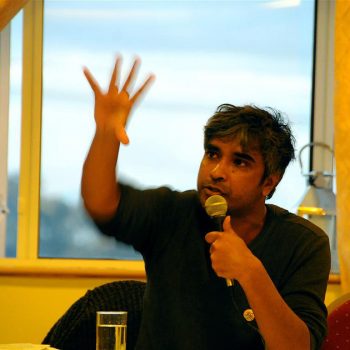
Contributed by Mothiur Rahman of New Economy Law, a legal innovation lab based in the UK, strengthening civic resilience for precarious futures. Having been invited to give a UK briefing for the 2018 Conference for the “Project for Integrating Spirituality Law and Politics” (PISLAP), I have been reflecting on what it means to bring these 3 domains together of law, politics and spirituality. Many might associate law and politics together, but joined with spirituality? Modern notions of spirituality often see spirituality as a personal individual pursuit, separated off from the political that is social and collective by definition. Why is this the case? This separation begins to make sense when one considers that the spiritual foundations of Christianity were being settled at a time when the idea of institutions and their functions were still in their intellectual infancy. Thus it is arguable that the manner by which “spiritual authority” was… Continue reading